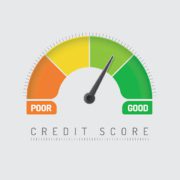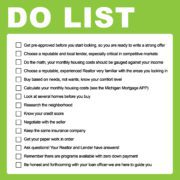The Pros and Cons of a Cash-Out Refinance
These are certainly crazy times. The COVID-19 Pandemic has the markets in turmoil. Many states, including Michigan, have issued stay home orders, and people are generally anxious about the future. People are looking for options and smart decisions.
One of the options many people have so that they feel more secure, is to do a cash-out refinance on their home. Let’s take a closer look at some of the benefits and possible downfalls of this.
There are three reasons that I generally advise as sound financial reasons to do a cash-out refinance:
- Home Repairs
- Pay Off Debt
- Conservative Investments with a Financial Advisor
We will Address Each of these reasons in more detail below, but before we can get to the reasons, it is important to determine whether there is enough equity in your home to pull cash out. Equity is the difference between what you owe and what your house is worth. Generally, banks will not allow more than 80 percent of the appraised value to be pulled out in a cash-out refinance. Your lender will most likely need to do an appraisal to determine value; however, you can utilize sites like Zestimate to get a general idea.
Home Repairs
Pulling out equity to do home repairs not only adds value to your life, it oftentimes adds value to your home. If the added value is more than the cost to do the work, you have just made a good investment. So even though you added closing costs and principle to your loan, you could be ahead of the game when you do end up selling.
Paying Off Debt (Debt Consolidation)
Paying off credit card debt and high interest debt is usually met with enthusiasm from the client. This debt is oftentimes weighing heavily on client’s monthly expenditures and is gladly paid off. We will address precautions regarding that below.
Other than paying off credit cards, there are options to pay off other debt. Oftentimes clients balk at adding debt to their mortgage to pay off shorter term installment debt. The argument is that paying off this is unwise because it is added to a longer term on a mortgage. I hear things like “I only owe five years on the car, so I don’t want to add that to a 15-year mortgage.” The problem with this argument is that they are not thinking about what could be done with the money they are freeing up.
Here is the math:
Lets’ say someone has a $20,000 installment loan at 6% interest paying $386/mo. After 5 years they will have paid $23,160. If they were to consolidate that into a 15-year mortgage at 3% they would pay $24,840 in 15 years. But that is $1, 600 more you say? True BUT what if you took that $386 that you freed up and invested conservatively? Making just 5% compounded annually over the 5 years you would make $25,594! If you kept that up for 15 years you would make $99,951!
Investments
Pulling out equity to make investments is a bit trickier. I do not normally advise this unless it is part of a financial plan overseen by a trusted financial advisor. The argument for investing is similar to the one that I made above. The problem is that investing is not for the weak of heart and hopeful gains can sometimes become devastating losses. If someone is going to pull out equity in their homes to invest, they need to have a CONSERVATIVE plan that has a high likelihood of success. Again, you really should have a financial advisor in on this plan.
Side Benefits of Doing a Cash-Out Refinance
Aside from home improvement, paying off debt and investing, a cash-out refinance might afford you the ability to lower your interest rate or remove mortgage insurance. This is especially true in the current market where interest rates have fallen and values of homes have risen.
Pitfalls to a Cash-Out Refinance
- Possible higher rate. As compared to a rate and term refinance (not pulling out extra equity), the interest rates on a cash out can be higher depending on your equity position.
- Enabling bad habits. Using them money to pay for vacations or buy non-essential luxury items is not a good idea for obvious reasons. Paying off credit cards can be a great idea as mentioned above, but if you then run up the cards again in a few months you have defeated the purpose. Be smart and don’t succumb to the allure of credit card debt.
- Foreclosure risk. Remember that a mortgage is a secured debt. If you don’t pay you can lose your home. Paying off unsecured debt with secured debt can be a risk if you simply cannot afford your debt. Occasionally, I have clients that come to my trying to solve all of their previous bad decisions with a cash-out refinance. Sometimes I can help but oftentimes, doing this is just prolonging the inevitable: they simply have too much debt and not enough equity to save the day.
Bottom Line
Using a cash-out refinance can make sense when interest rates are good and you have a sound use for the money. Do not use it as a rescue maneuver that could cause you to lose your home or to buy something you don’t need. In these trying times, it is imperative that you have good advice. We can guide you and help you make the best decision for your unique situation.












Leave a Reply
Want to join the discussion?Feel free to contribute!